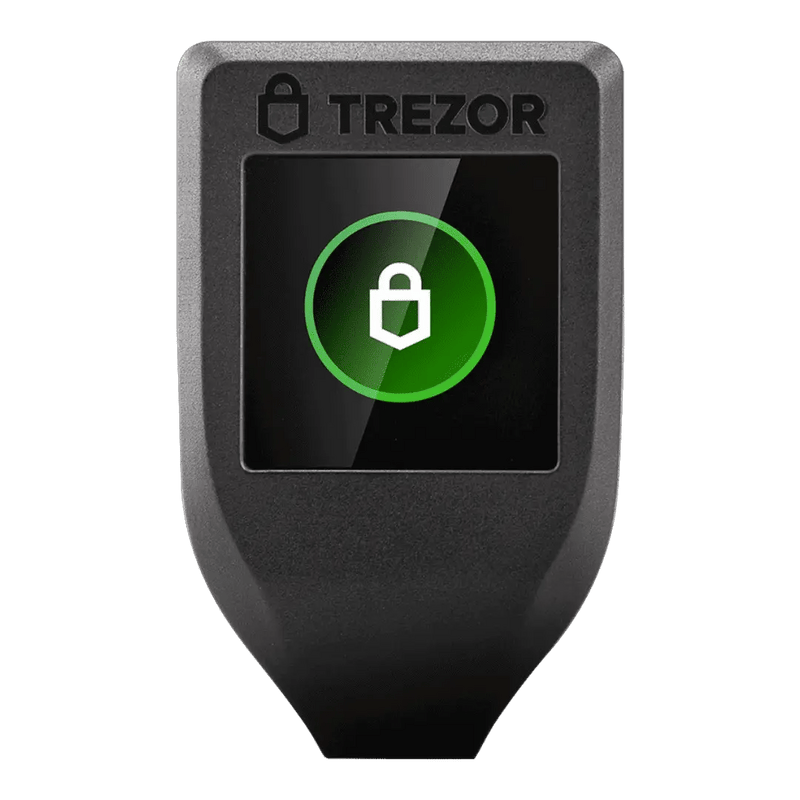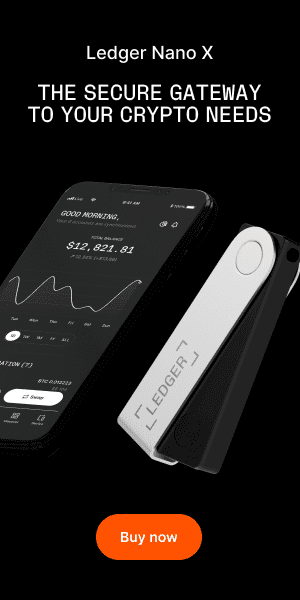In this beginner’s guide to crypto wallet for 2024, we explain what a crypto wallet is and why it’s important to access your wallet’s private keys. Plus, there is a difference between a software wallet, a hardware wallet and a paper wallet.
Once you have purchased your first cryptocurrency, it’s essential to consider your security and how you will store your crypto assets. It’s most likely you have bought your crypto on an exchange. However, keeping crypto in exchange is not good practice. Now, you must consider how to keep your crypto safe and how much responsibility you want.
So, let’s dive into this beginner’s guide to different types of Crypto Wallets to help you find the best wallet.
Beginners Guide to Crypto Wallets
In this beginner’s guide to crypto wallets, we explain and discuss the different types of crypto Wallets, such as hardware, software, online, and paper wallets. Picking the right crypto wallet is important, as you need to consider the safety and security of your cryptocurrency assets.
What is a Cryptocurrency Wallet?

To use cryptocurrency, you’ll need to use a cryptocurrency wallet. A wallet is a secure digital wallet that stores, sends, and receives digital currency like Bitcoin. Although I mention “store, ” cryptocurrency is not actually “stored” in a wallet but on a coin’s blockchain. Your wallet is just the software designed to interact with the blockchain.
Instead, your wallet stores the address, not the actual crypto tokens. Bitcoin wallets interact with the Bitcoin blockchain, allowing Bitcoins to be moved between addresses by the owners of those addresses. Also, it allows users to see the balances associated with an address.
A blockchain address is similar to an email address and is used to receive and send funds on the blockchain. Similar to how you would use your email address to send and receive messages and represent a destination for a cryptocurrency payment.

Each blockchain address contains a string of numbers and letters but can also be shown as a scannable QR code. These addresses may have specific identifiers depending on the type of cryptocurrency. Different types of cryptocurrency will have different types of addresses and cannot accept other forms of cryptocurrency. This is an important factor to remember. For example, you cannot send Bitcoin to an Ethereum address. If you were to do so, the transaction would be non-returnable, and you would lose your funds.
You can manage your assets using four different types of wallets: hardware, Online, Software, and Paper Wallets.
What are Private Keys?

First, let’s talk about your private keys, as this is an important part of the story. A private key is a sophisticated form of cryptography that allows you to access your cryptocurrency. It’s an integral aspect of Bitcoin and Altcoins and helps you to protect yourself from theft and unauthorized access to funds. When you can access the private key, you can access the funds.
Some wallets let you control your private keys. However, some are custodial and don’t. If you are keeping your crypto assets over on an exchange, they are custodial. Therefore, you are entrusting a third party with these private keys and mandating them as a safeguard. Owning and having access to your private keys gives you much more power and control. But you’ll also need to take care of their security and ensure that you keep these keys somewhere safe, offline and away from potential harm.
3 Different Types of Crypto Wallets
Confused about the different types of crypto wallets available? In this guide, we’ll break down the three main types of crypto wallets: software wallets, hardware wallets, and paper wallets, so you can decide which is right for you.
So, let’s dive in and explore the world of crypto wallets!
Crypto Hardware Wallet

Hardware wallets are considered the most secure way to store your crypto. They are offline storage options for private keys. They are physical, dedicated hardware that is specifically built to hold cryptocurrency and keep it secure. These devices can go online to make transactions and get data and then be taken offline for transportation and security.
They also store your private keys offline and on your device. You can also use the device to verify transactions so funds never leave your wallet without confirmation. With your hardware wallet stored offline, it is kept away from any potential hackers, who would need to hold the device physically (and know the pin) to be able to steal your funds.
Different hardware wallets are available, such as a Ledger and Trezor Hardware wallets range in price from $59 to $150+. I don’t have a clear preferred device as they both have their advantages and disadvantages. Please ensure that you always purchase new and sealed hardware wallets. Ensure they haven’t been tampered with and are from reputable sources.
Examples of Hardware Wallets
Colour Touch Screen | Mobile Friendly | Cheapst Hardware Wallet |
Trezor Model T | Ledger Nano X | Ledger Nano S |
4/5 | 4.5/5 | 4/5 |
$215.00 USD |
$149.00 USD |
$59.00 USD |
Crypto Online Wallet

Online wallets are online services that enable you to access your crypto assets from any browser that’s connected to the internet. With an online wallet, you don’t download an app; rather, data is hosted on a real or virtual server.
Some wallets let you control your private keys, and some are custodial where you don’t. When you leave your crypto assets on a cryptocurrency exchange platform, you’re actually using the platform’s online wallet. Most exchange wallets are custodial wallets.
Recommended (and non-custodial) Online wallets include the likes of Blockchain.com and MyEtherWallet. Custodial online wallets (where you don’t control your private keys directly) include the likes of the Coinbase or Binance Exchanges. However, keeping crypto on these exchanges is not advisable.
The biggest advantage of online wallets is that they are easily accessible from any computer or device with an internet connection. Plus, they are most likely free to download. However, this is also their biggest disadvantage, as they can become targets for hackers.
Crypto Software Wallets

Software wallets are applications for managing cryptocurrencies that can be installed on your computer or smartphone. You remain in control of your private keys, which are not shared with nor controlled by a third party.
There are many types of software wallets available;
- Desktop wallets will include Exodus or Trust Wallet.
- Browser extensions such as Metamask and Phantom Wallet.
- Mobile Wallets include Coinbase Wallet & Trust Wallet.
Mobile phones are a great way to access your crypto on the go. However, as software is installed on your PC or mobile device, it is connected to the internet, potentially exposing your private keys to hackers. Also, mobile phones are regularly taken outside the home and could potentially be lost.
Software Wallet Examples
At Every Bit Helps, we have covered several crypto software wallets, and some of our favourites are;
Crypto Paper Wallet

Next, we have our paper wallets, another offline option for storing crypto assets. As the name suggests, the process involves printing the private keys and their corresponding public address onto a sheet and storing them.
This is an excellent and simple way to store your cryptocurrency keys offline. But it will require you to pay attention and care to this paper. If your paper wallet gets lost or destroyed, you will permanently lose access to your crypto assets. Also, processing a transaction with a paper wallet can be long-winded and unsafe.
In this method, you must manually enter your keys in a transaction tool. You typically do this using your computer’s internet browser, which could expose the keys to a cyber attack.
Hot Wallet vs Cold Wallet: What are the Differences?
Crypto wallets are either custodial or non-custodial. Let us explain what that is and the differences between them.
Custodial Wallet
A custodial wallet is a type of cryptocurrency wallet in which a third-party service provider, such as an exchange, holds the private keys on behalf of the user. This means that the user doesn’t have complete control over their digital assets, as the third-party service provider manages the security and storage of the private keys.
While custodial wallets are often more convenient for beginners, they are considered less secure than non-custodial wallets, as they expose the user to the risks of hacks and breaches from the service provider.
Non-Custodial Wallet
A non-custodial wallet is a cryptocurrency wallet where the user has complete control over their digital assets, including private keys. This means that the user is responsible for the security and storage of their private keys, and a third party is not involved.
Non-custodial wallets are generally considered more secure than custodial wallets, as the user is not exposed to the risks of hacks and breaches from a third party. However, non-custodial wallets require more technical knowledge and can be less convenient for beginners.
Hot Wallet vs Cold Wallet: What are the Differences?
A hot wallet is always connected to the Internet, making it more vulnerable to hacking. On the other hand, a cold wallet is not connected to the Internet, making it more secure.
A paper wallet is an example of a cold wallet, and Hardware wallets are a bit of both. When not connected to the internet, a hardware wallet is considered a cold wallet, but when plugged into an internet-connected computer, it becomes a hot wallet.
Understanding the differences between these wallets is vital to keep your digital assets safe and secure.
Conclusion
Choosing the right crypto wallet is essential. There are different types, including hardware wallets that are super secure but can be complex and online wallets that are easy to use but not as safe. Software wallets are handy apps on your phone or computer, while paper wallets involve keeping your crypto details on a physical piece of paper. It’s all about balancing safety and convenience to pick what works best for you. Always remember the security of your digital money is in your hands, so choose wisely!
FAQs
What kind of crypto wallet is best?
The “best” crypto wallet can vary depending on the user’s needs and requirements. However, hardware wallets are often recommended for their enhanced security features. They store the user’s private keys offline, making them immune to online hacking attempts. Mobile and web wallets can also be a good option for ease of use and convenience, but they are generally considered less secure than hardware wallets.
How many kinds of crypto wallets are there?
There are five main types of cryptocurrency wallets:
– Hardware Wallets: Store crypto offline, highly secure.
– Desktop Wallets: These are installed on a PC or laptop and are accessible from that single device.
– Mobile Wallets: Apps on your smartphone are convenient but can be less secure.
– Web Wallets: Accessible via internet browsers, vulnerable to online threats.
– Paper Wallets: Physical documents containing your crypto keys, secure but can be easily lost or damaged.
What are the most secure types of Cryptocurrency wallets?
Hardware and paper wallets are generally considered the most secure cryptocurrency wallets.
– Hardware Wallets: They are immune to online hacking attempts as they store the crypto offline.
– Paper Wallets: These are physical documents containing the keys to the cryptocurrency, immune to online hacking, but can be lost, damaged, or stolen physically.
What is the difference between a crypto account and a crypto wallet?
A crypto account is an account on a cryptocurrency exchange or platform where users can buy, sell, or trade cryptocurrencies. It is hosted online and managed by a third-party provider. A crypto wallet, on the other hand, is a tool that allows users to store, send, and receive cryptocurrencies. It stores users’ private and public keys to access, send, and receive their cryptocurrencies. A crypto account is like a bank account for managing your cryptocurrencies, while a crypto wallet is like a personal wallet where you keep your digital assets secure.









9 responses
I think I need a Q&A tutorial…….do you have anything like that? I don’t mind paying for quality time……thanks
I forgot to add that the wallet video was pretty good…..I am totally new to crypto currencies but I see it as an important part of future commerce…..and yes, I am older
Beginner’s guide to crypto wallets was very informative and you made it simple to understand. Thank you
Thank you for your comment, I’m really pleased to hear its helped you.
We Want to Submit a High Quality Awareness Article for All Your Blockchain Users
Hello,
Just gone through your site and was wondering if you accept guest blog posting? We want to submit our top quality highly searched article on your website for all your crypto/blockchain users and in return we would want a reference link to our website.
We are one of the leading DeFi wallet companies in Europe with the facility of card, wallet & exchange.
Let us know if there is a way to submit guest posts on your website. We would love to submit our content piece on your website.
Looking forward to your reply.
Regards,
Team Eidoo.
please email me at louise@everybithelps.co.uk
Hello I am a beginner crypto.com app user I have been trying to find a video that explains the functions on the The front screen for example the balance and underneath the balance are percentages and pamounts showing a plus or minus figures
and I have no idea what this is for or what it means and cannot find a tutorial to explain it. I really would appreciate if you could explain this Thank you
This is the amount that the price has changed in the past 24hrs
3